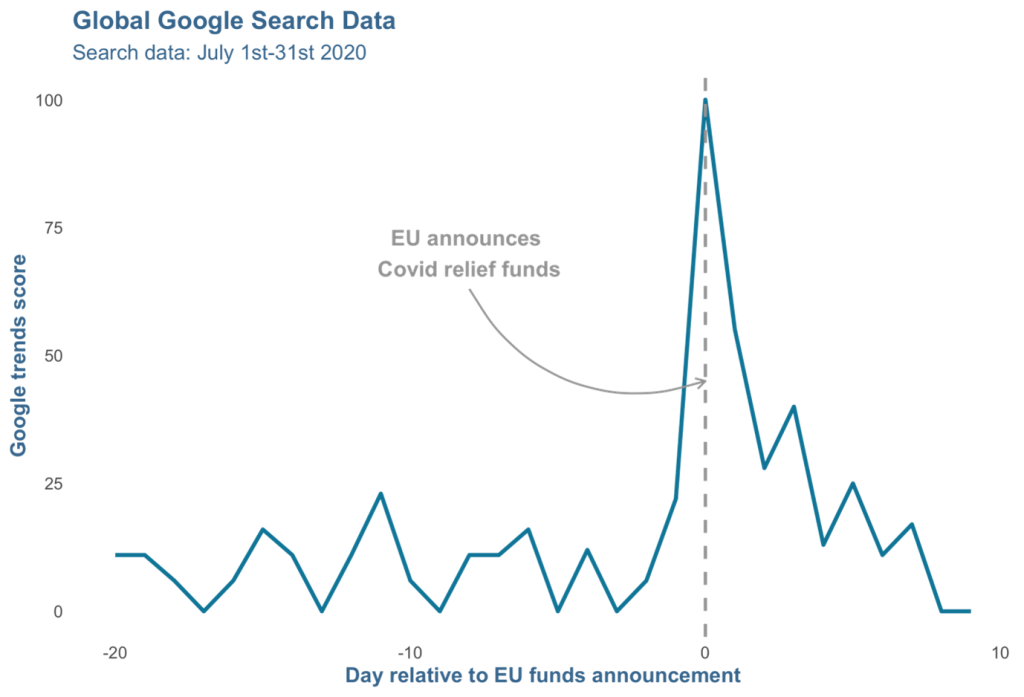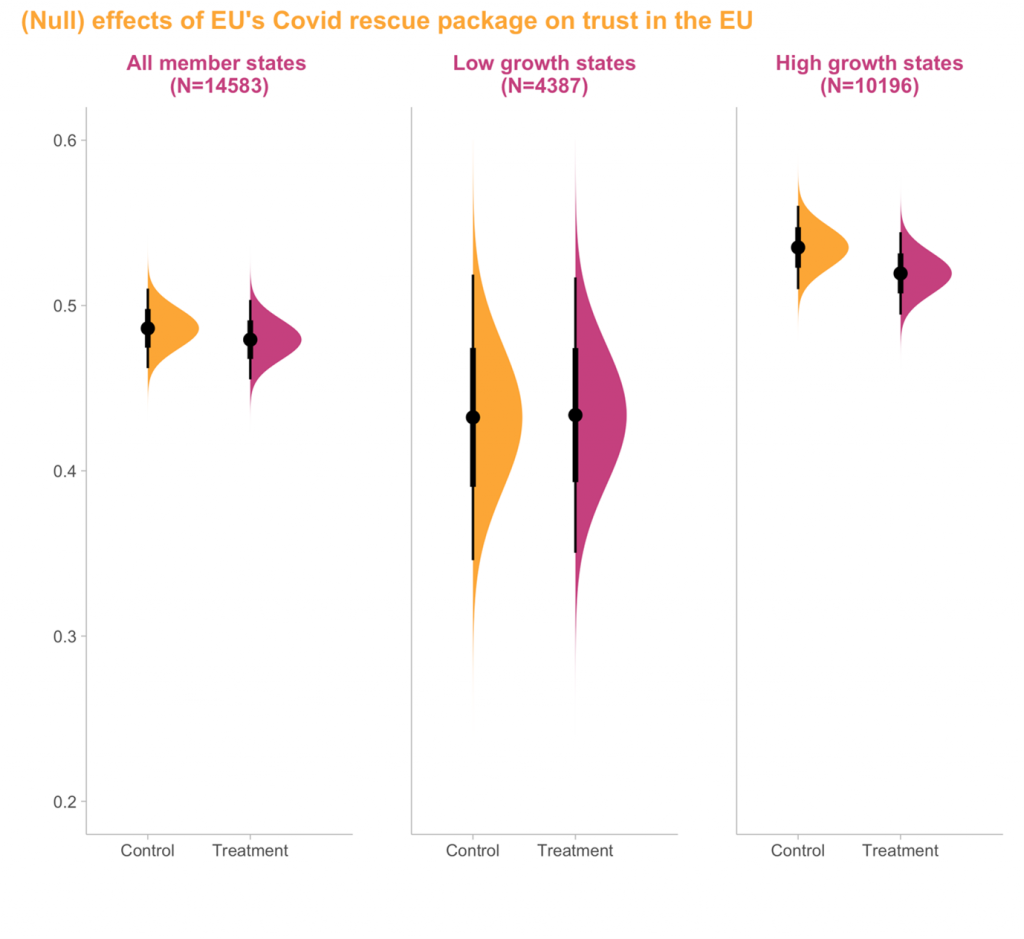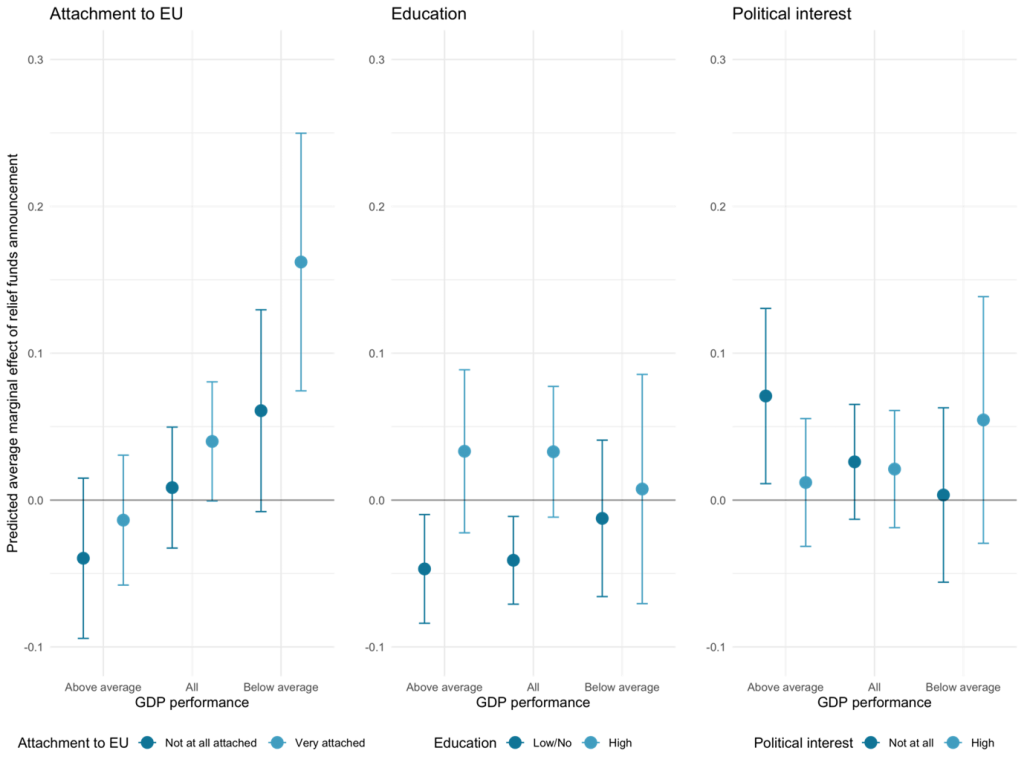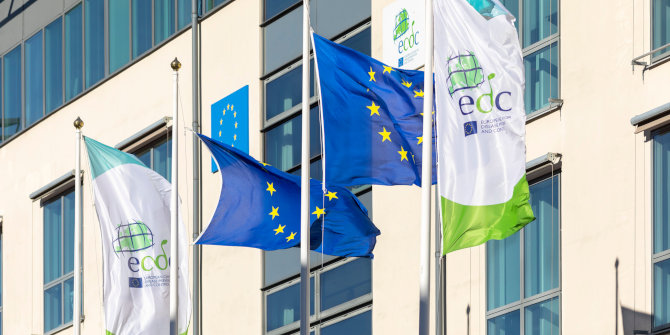Did the announcement of the Covid-19 recovery package (Next Generation EU) in 2020 have a positive impact on people’s support for the EU? Barbara Krumpholz, Daniel Devine and Stuart J. Turnbull Dugarte present survey evidence that the €750bn package passed by the European council on 21 July 2020 had no effect on attitudes towards the EU, regardless of how severely member states were affected by the crisis.
As the Covid-19 crisis unfolded in Europe, the EU was criticised for its inaction, with the majority of EU citizens unconvinced the EU had lived up to its responsibilities and many concluding that it was largely irrelevant to the crisis response. The European Covid-19 relief package passed on 21 July 2020 was meant to convince citizens of the opposite: breaking with the norm of no common debt issuance and austerity politics as the EU’s go-to response in times of economic crisis, the deal was an exceptional sign of European solidarity.
The announcement of the Covid-19 relief funds offers an ideal case study of the formation of citizens’ attitudes toward the European Union. Utilitarian theories of EU support argue that individual, rational, cost-benefit calculations determine support for the EU: if individuals indeed base their judgement on the (perceived) individual and national benefits from EU membership, then the announcement of the Covid-19 relief package should have improved attitudes towards the EU. After all, the package was an enormous amount of money during a critical public health crisis.
EU policymakers are well aware of this assumed relationship and appear to use intra-European financial redistribution to “buy support”. However, whether financial transfers and EU structural policies have the desired effect is unclear. Their effect might be contingent upon individual awareness of such financial redistribution, levels of education and a common European identity.
In a new study, we use a quasi-experimental research design to argue that the announcement of the Covid-19 relief funds had no significant effect on trust in the EU – against the expectations of utilitarian theories and, presumably, EU policymakers. The unexpected announcement of the relief package happened during the fieldwork of the Eurobarometer survey in July 2020. Since the announcement happened independent of fieldwork, this provides us with a natural experiment: a control group of those interviewed before and a treatment group of those interviewed after.
This improves our confidence that it is only the announcement of the relief funds that is responsible for any changes in public attitudes toward the EU: there is nothing else that could plausibly separate the people interviewed just before and just after the announcement. There’s also evidence people noticed the announcement. We observe popular interest in the EU deal over time using Google Trends data (Figure 1) and see a significant and positive discontinuity in interest that coincides with the date of the announcement, suggesting that respondents interviewed after the announcement had more information than those before.
Figure 1: Google Trends search interest in EU Covid-19 relief funds
Note: For more information, see the authors’ accompanying paper.
The findings are presented in Figure 2. In short, the figure shows that the Covid-19 relief funds do not seem to have changed levels of trust toward the EU. The effects are insignificant even when conditioned by the severity of the economic shock facing member states as a result of Covid-19. We also tested whether the effects of the announcement depended on key individual characteristics such as education, political interest and attachment to the EU. These results are plotted in Figure 3.
Figure 2: Effect of EU relief funds on trust
Note: For more information, see the authors’ accompanying paper.
Figure 3: Individual level interaction effects
Note: For more information, see the authors’ accompanying paper.
Overall, individual characteristics show muted interaction effects, except for those that were most attached to the EU in countries with below average GDP growth, amongst whom the announcement increased trust by 16 percentage-points. However, this is not statistically different from those who are not at all attached to the EU in those countries. Similarly, for education, the announcement had a small negative effect amongst those with low or no education in countries that had above average GDP growth. There were no statistically different results regarding political interest. Overall, there is only some evidence that the announcement boosted support amongst those very attached to the EU and in countries hardest hit by the pandemic.
We also extended our analysis to other outcomes such as people’s satisfaction with the EU’s policies during the pandemic, EU economic expectations, national economic expectations, and the EU differential (whether people trust the EU more than their national government). As Figure 4 shows, we found no significant effects for satisfaction with the EU’s policy response, but a positive impact of the announcement on economic expectations at the national and EU levels in countries with below EU average GDP growth (the opposite being true in countries with above EU average GDP growth). These significant effects on economic expectations demonstrate that that the news did drive citizens to update their view of the economy in response to the EU’s rescue package but the news did little to influence trust in the institution distributing these funds.
Figure 4: Alternative outcome variables
Note: For more information, see the authors’ accompanying paper.
Our findings show that the Covid-19 relief fund had in general no significant positive impact on citizens’ trust in the EU, except in some specific circumstances; however, there are also circumstances in which there was a negative impact. These findings contribute to our understanding of support for the EU by providing evidence that unique large-scale, one-off, inter-EU financial transfers do not necessarily improve citizens’ trust in the EU. While these findings add a missing piece of evidence to a large puzzle, they do not rule out causal mechanisms between EU financial redistribution and public support at work elsewhere. However, they suggest a need for caution amongst policymakers trying to ‘buy’ EU support from sceptical citizens.
Note: This article gives the views of the authors, not the position of EUROPP – European Politics and Policy or the London School of Economics. Featured image credit: European Council









